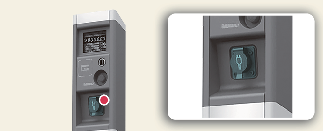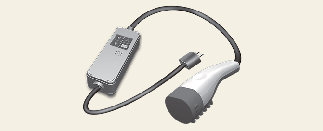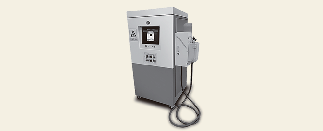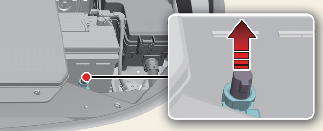Precautions for charging electric vehicle



* Actual charger image and charging method may vary in accordance with the charger manufacturer.
Unlock the charging connector in an emergency

If the charging cable does not detach due to battery discharge and failure of the electric wires, open the bonnet and slightly pull the emergency cable as shown above. The charging connector will then unlock.

-
Electromagnetic waves that are generated from the charger can seriously impact electronic medical devices, such as an implantable cardiac pacemaker.
When using electronic medical devices, such as an implantable cardiac pacemaker, make sure to ask the medical team and manufacturer whether charging your electric vehicle will impact the operation of the electronic medical devices, such as an implantable cardiac pacemaker.
-
Check to make sure there is no water or dust on the charging cable connector and plug before connecting to the charger and charging inlet. Connecting whilst there is water or dust on the charging cable connector and plug may cause a fire or electric shock.
-
Be careful not to touch the charging connector, charging plug, and the charging inlet when connecting the charger connector cable to the charging outlet and the charging inlet on the vehicle.
-
Comply with the following in order to prevent electrical shock when charging:
-
Use a waterproof charger.
-
Do not touch the charging connector and charging plug with your hands wet, or do not stand in water or snow whilst connecting the charging cable.
-
Be careful when there is lightning.
-
Be careful when the charging connector and plug are wet.
-
-
Immediately stop charging when you discover abnormal symptoms (e.g., smell, smoke, etc.)
-
Replace the charging cable if the cable coating is damaged to prevent electrical shock.
-
When connecting or removing the charging cable, make sure to hold the charging connector handle.
-
Only use the charging cable (if equipped) certified by Kia. Using a separate extension cable, such as a reel or an uncertified cable, may cause abnormalities in electrical outlets, leading to fire or explosion.
-
If you pull the cable itself (without using the handle), the internal wires may be disconnected or get damaged. This may lead to electric shock or fire.
-
Do not leave the vehicle with the charging door open. An open charging door may indicate that the vehicle door has been unlocked and may be subject to vehicle theft.

-
Always keep the charging connector and charging plug-in clean and dry condition. Be sure to keep the charging cable in a condition without water or moisture.
-
Make sure to use the designated charger for charging the electric vehicle. Using any other charger may cause failure.
-
Before charging the battery, turn the vehicle [OFF].
-
When the vehicle is switched [OFF] whilst charging, the cooling fan inside the motor compartment may automatically operate. Do not touch the cooling fan whilst charging.
-
Be careful not to drop the charging connector. The charging connector can be damaged.
-
Do NOT use an extension cord, when using the L1-Trickle charger, as this may overheat and/or cause damage.

When charging or right after charging the high voltage battery, the cooling will be made using an air conditioner system to control the high voltage battery temperature.
In this case, the noise might occur from the air conditioner compressor and cooling fan, but this is due to normal operation.